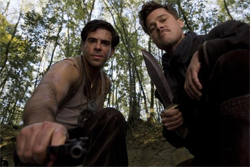Inglourious Basterds is more Once Upon a Time in the West and The Good, the Bad, and the Ugly than it is The Dirty Dozen or Guns of Navarone. Don’t be mistaken by the WWII setting or the easily recognized historical figures—Quentin Tarantino’s latest film is fantasy. Damn good fantasy.
Starring an ensemble cast including Brad Pitt, Diane Kruger, and (relatively unknown) Austrian actor Christoph Waltz, Inglourious Basterds follows a group of Jewish-American soldiers (from whom the film gets its title) hell-bent on killin’ Nazis. The film is presented in chapters, much like Pulp Fiction, which introduce other plotlines: a Jewish cinema owner (Mélanie Laurent) living under an assumed identity in Paris, a German actress (Kruger) working as a double-agent, and a sadistic SS officer (Waltz) named Hans Landa, a.k.a. the “Jew Hunter.”
While pop culture references tend to be highlights of Tarantino’s films—the true, hidden meaning of Madonna’s “Like a Virgin” (Reservoir Dogs), David Carradine’s analysis of Superman (Kill Bill), or the Royale with Cheese/Big Mac debate (Pulp Fiction)—many references, like the conversation that exposes King Kong as an allegory for slavery, fell flat in Basterds.
But Tarantino does succeed in upending the melodramatic conventions of World War II filmmaking, especially for films that touch on the Holocaust. Any time a scene becomes too heavy or emotional, Tarantino seems to be telling audiences, “Yes. It’s okay to laugh at that dead Nazi being scalped. Or Eli Roth bludgeoning an enemy officer to death. Or Brad Pitt’s artistic flair with a knife. Don’t worry. It will feel good. I promise.” And if you aren’t laughing at the expense of the National Socialist Party, you will most certainly laugh at Pitt’s Foghorn Leghorn accent.
The standout of Basterds—and honestly, its savior—is Waltz. He steals scene after scene as Landa, the film’s antagonist, who can be best described as a hellish, perverted Columbo-type detective. He effectively carries the film from the stellar first scene up until the closing credits. Waltz certainly deserves an Oscar nomination this winter for his performance.
The two and a half hour running time of Basterds is driven by each character’s pursuit of vengeance, indicating its strong spaghetti-western influence.
One of the typical critiques of the genre is that its conclusion is merely the culmination of that drive for vengeance, and the film universe does not extend beyond the villain’s demise. Ultimately, the buildup toward Basterd’s explosive conclusion is entertaining, but only within the paramaters of the fantastical plotline.
However, isn’t that the purpose of fantasy? We act out our wildest dreams, without regard for future repercussions and aftermaths. If the end result is the cathartic release provided by mass Nazi death, who cares about what happens next?





